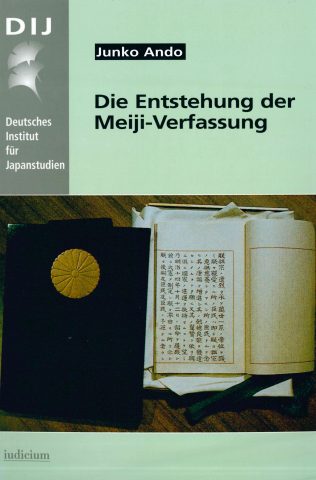
Download
Details
2000, ISBN 3-89129-508-1, € 28,00, iudicium Verlag, Munich, 273 pp., hardcover [Order]Authors
Die Entstehung der Meiji-Verfassung: Zur Rolle des deutschen Konstitutionalismus im modernen japanischen Staatswesen (The Origins of the Meiji Constitution: The Significance of German Constitutionalism for the Modern Japanese State)

In the current debate about revisions to the Japanese constitution, references to US prescription are often made. These are reminiscent of the way the Meiji constitution has been judged to be a mere adoption of the Prussian constitution abetted by German legal advisors. The author of the above work, however, questions this generally accepted view in her analysis of the reception and assimilation of so-called German constitutionalism in the formation and later interpretation of the Meiji constitution. In her examination of the constitutional advice offered by the four most eminent German legal advisors (Rudolf von Gneist, Lorenz von Stein, Hermann Roesler, and Albert Mosse), Ando draws on sources which, in part, have hitherto received little attention from other international research. It is therefore within the context of her critique of source materials that Ando offers a reinterpretation of Roesler’s draft constitution that counters previous claims by Johannes Siemes. In addition, Mosse’s contribution as an advisor during the writing of the Meiji constitution is now made explicit for the first time.
The four German advisors’ interpretations of German constitutionalism reveal not only their commonality but also their considerable differences. Indeed, Roesler and Mosse held quite opposing views, with Roesler a conservative monarchist and Mosse a political liberal. This obviously allowed the Japanese insight into certain interpretative latitudes within German constitutionalism itself. Certainly, Mosse’s contribution helped ensure that the Meiji constitution was more liberal than it would have been under Roesler’s influence alone. In addition, Ando’s work proves incorrect any notion that the Meiji constitution is simply a Prussian clone. The Japanese had to decide on one of the interpretations presented by the German advisors, and their decision was influenced by their own traditional ideas of power and how to rule: on the one hand, the Confucian concept of tokuchi, and on the other, the views on the nature of imperial rule (tennō shinsei), influenced by the Kokugaku and Mito-gaku schools. This is how a constitution came to be written which in form corresponded technically to European standards but which in its interpretation was molded by two ambivalent indigenous conceptions of how to govern.